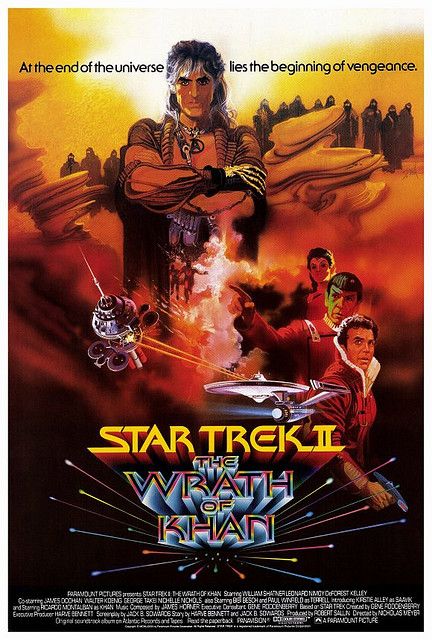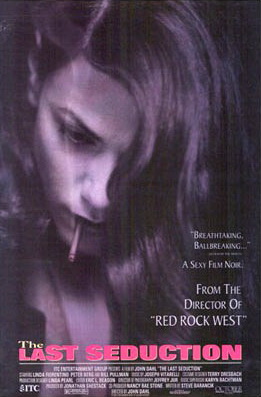Now Playing
Current DJ: Nicole Oppenheim: Ear Candy
Thee Sacred Souls Live for You from Got A Story To Tell (Daptone) Add to Collection
Requests? 773-DJ-SONGS or .(JavaScript must be enabled to view this email address)
Welcome to The Fourth Wall, CHIRP's weekly e-conversation on cinema. This week's subject is the sci-fi classic Star Trek II: The Wrath of Khan.
This edition is written by CHIRP Radio volunteers Kevin Fullam and Clarence Ewing.
 Clarence:
Clarence:
Even after over 60 years, 13 movies, 7 television series, and a galaxy of non-canon books, comics and Internet fan fiction, Star Trek II: The Wrath of Khan (1982), remains THE Star Trek story in many fans' minds. The story is actually pretty basic: take one iconic starship captain (William Shatner) and pit him and his crew in a pitched battle against a quintessential nemesis (Ricardo Montalbán) who's seeking ultimate payback for a past defeat and exile. Many lives are in the balance, and before it's over, there will be tragedy on both sides.
It’s been more than 30 years since the release of Star Trek II: the Wrath of Khan, and it remains a jewel in the crown of science-fiction cinema, cementing one of the first mega-successful attempts at adapting a TV show into a film. Of course, the main pull quote from that film, Captain Kirk’s rage-filled retort to his arch-enemy (“KHAAAAAAAAAAAAAN!!!”) has been parodied and referenced in other movies and TV shows ad infinitum. But there’s so much more.
The general consensus is that of all the Star Trek movies, Khan is the best. I feel in this regard the public's view is spot on, even when comparing it to the stunning special effects of the recently rebooted Trek (alternate) universe. This movie carries a resonance that isn’t there with most, if not all, of the other Star Trek films. And I think it does so for these reasons:
It’s an all-around great story. Khan isn't just about spaceships waging battle. Just as important are the themes of friendship, revenge, aging, and past mistakes coming back to bite you in the ass. It helps that the cast had a few years to work together on the TV series so they could get to know the characters and build relationships that they could carry to the big screen.
It’s Shakespeare in space. The most successful lead actors in the Star Trek franchise tend to be the ones who have a lot of experience performing Shakespeare, where the ability to generate powerful emotions while standing next to cardboard cutout scenery is a must. Subtlety and irony is not what’s required in a space opera. William Shatner and Ricardo Montalbán understood this and set the tone perfectly.
You don’t need to be a Trekkie to follow what’s going on. Other movies in the Star Trek franchise require more than a little background knowledge to fully appreciate the current story being told. An audience member doesn’t have to know that Khan is basically a sequel to an original Star Trek episode (“Space Seed,” Season 1, Ep. 22) in order to understand what’s going on. A cursory knowledge of what Star Trek is is all that’s required.
Welcome to The Fourth Wall, CHIRP's weekly e-conversation on cinema. This week's subject is the film The Last Seduction.
This edition is written by CHIRP Radio volunteers Kevin Fullam and Shawna Kaiser.
 Kevin:
Kevin:
Hang on to your heart, your wallet, and your life -- if Bridget Gregory of The Last Seduction is in town, all three are at risk. Was it a victory for feminism to see a female cinema protagonist that was as ruthless as any male to grace the screen? Let's discuss...
-----
In the annals of Neo-noir, The Last Seduction may have traveled one of the oddest paths to glory. First aired by HBO in 1994 before the channel garnered its current status as a purveyor of high-brow television, Seduction was originally pitched as a throwaway "skin-e-max" (in the words of screenwriter Steve Barancik) flick. Lo and behold, a quality piece of cinema emerged, powered by a stunning performance from lead Linda Fiorentino as the aforementioned Ms. Gregory. The film was then ushered into the box office for a brief run (grossing over $5 million) and garnered a four-star review from Roger Ebert, who listed the movie on his Top 10 list for the year. However, despite generating serious Oscar buzz, Fiorentino was ruled ineligible by the Academy because the film had aired on cable before arriving in theaters.
The plot in a nutshell: Bridget is married to Clay (Bill Pullman), a shady would-be doctor who's dealing drugs in order to pay back a loan shark. After a big score, the couple quarrel; Clay hits Bridget, and she decides to hightail out of NYC -- with their $700,000. Bridget bunkers down in a suburb of Buffalo until her divorce goes through, while Clay (now in serious physical danger from Mr. Loan Shark) hires private eye Harlan (Bill Nunn) to find his wife and recover the loot.
 Elliot Gitter of Teleporter will perform solo at CHIRP Night at the Whistler on April 25. (Photo by Harley Friedman)
Elliot Gitter of Teleporter will perform solo at CHIRP Night at the Whistler on April 25. (Photo by Harley Friedman)
Elliot Gitter is the lead guitarist, vocalist and principal songwriter for Teleporter, who opens for ADT at CHIRP Night at the Whistler this Wednesday, April 25 at 8 pm.
Gitter will perform solo at the Whistler, focusing mostly on new material. We caught up with him to find out what he has in store for the Whistler audience.
Q : How long has Teleporter been together?
A: Nick and I started playing together with Jeremy in 2012 and recorded The Martian Chronicles in 2013 with engineer Barrett Guzaldo. At the time, I was living in a house in Chicago with several of my friends. I recorded the demos at my home studio, using an eight-track analog console. We would sample a bunch of sounds and create music. After we completed the sessions, Barrett went on to create Treehouse Records with Matt Gieser.